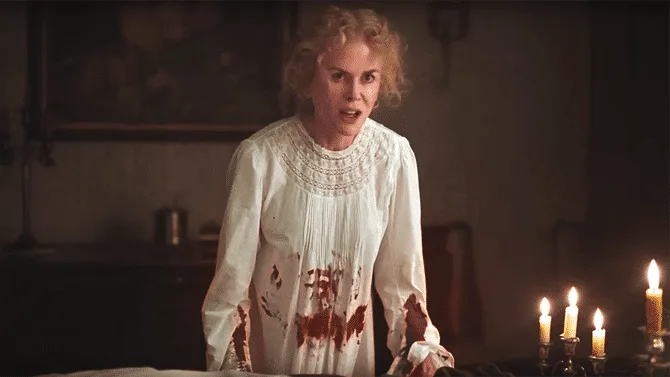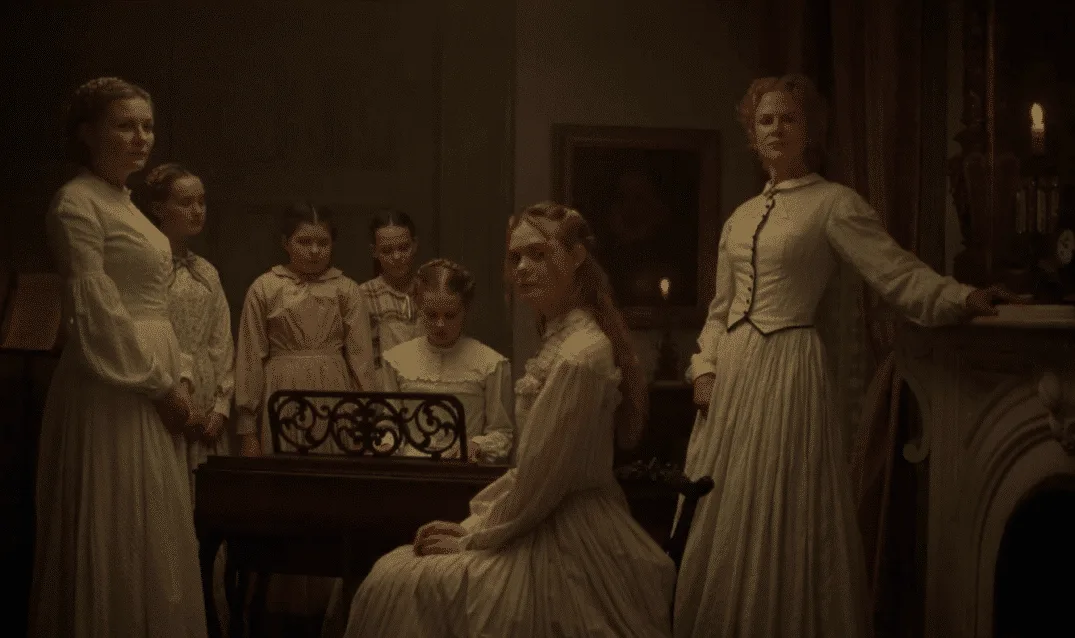
Happily, the saving grace here is Sofia Coppola. Whilst her filmography isn’t vast, she’s shown that she has a deft hand when it comes to drawing out new subtleties from even the best-known stories. For example, most people know who Marie Antoinette was and what became of her; in her film of the same name, Coppola managed to make her story poignant again by showing her as a girlish, vulnerable figure undone by frantic political upheaval, not some staid figure or (as popular propaganda had/has it) an aloof idiot who thought the poor could eat cake if they didn’t have bread. If anyone could recast something familiar in a new set of ways, then perhaps Coppola could. Adding an intriguing cast, the stage was set. This remake could well be worthwhile.
Virginia, the 1860s. The story starts with a little girl, Amy, gathering mushrooms in the woods near the boarding school where she studies and lives. It’s a pretty, sylvan scene, but the Civil War is in its death throes just nearby and the booming of cannon keeps interrupting the birdsong (this totemic noise continues throughout the film until it becomes stiflingly silent when it finally stops.) Amy is startled to see a wounded Union soldier sheltering underneath a tree; he asks for her help, and so she supports him back to her school, where the last few inmates there with no other place else to go eventually carry him indoors to treat his wounded leg. The man is Corporal John McBurney (Colin Farrell), a recently-arrived Irishman who only signed up for the Yankee cause for money. Panicked and injured during a recent battle, he had escaped. Hence, as he’s keen to point out, he has survived. The women at Miss Martha’s Seminary ponder what to do with him, but decide to let him recuperate.
His presence in the school soon changes their lives, however. At first it’s barely perceptible, but the girls (even the very young girls) respond to there being a man around by wanting to help him, or please him, or even just talk to him. Even the two responsible adults, Miss Martha herself (Nicole Kidman) and Miss Edwina (Kirsten Dunst) forget their tight-laced Christian demeanours in his presence – even if only momentarily, before they snap back into type. All the women and girls begin to take more care over their appearances, dressing up for him, squabbling over jewellery and dresses, and all of them seem completely pliable after even a kind word or two from McBurney. It’s a situation he’s very keen to exploit.

Although there’s barely a raised voice in The Beguiled, and we see trickery, rather than all-out violence, the tension simmers along unmercifully all the way through the film. This is due to the above-mentioned cannon fire which never moves off completely, the proximity of troops from both sides of the conflict, and of course the almost unbearable goings-on within the school: those old friends sexuality and envy move through the cosy, quiet rooms like a miasma, eventually giving rise to something like Misery (1990) where a man is hobbled and brought down. Hell hath no fury like a woman scorned, as the old saying goes – well, perhaps, but much of it in The Beguiled is in word and not deed, whilst the deeds themselves – when they occur – are not protracted, or even shown on screen that much. The final act – here, as in 1971 – may therefore not feel like an adequate pay-off for everyone; for me, it was completely in keeping with the manner of the story. With a man around, the women have begun to re-assume the more traditionally feminine roles and interests they’ve had to set aside, because the slaves are all gone and they must do their own digging and their their own shooting (if needs be). When that man transgresses, manipulating them and using them, the women are left with their traditional feminine pursuits, so they have no option but to use these as their weapons: the film concludes in an unholy trinity of needlework, cooking and sex. Even in times of war, even on the losing side, feminine wiles and pastimes can be lethal.
A worthwhile update to a challenging original piece of Southern Gothic, The Beguiled is in cinemas now.
